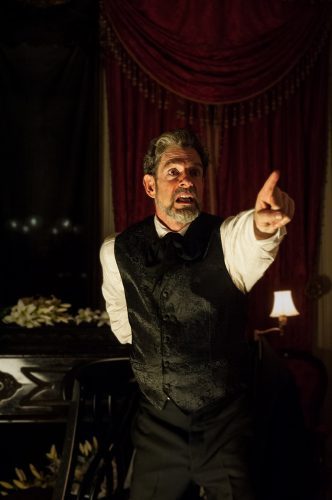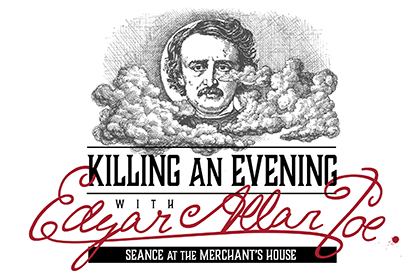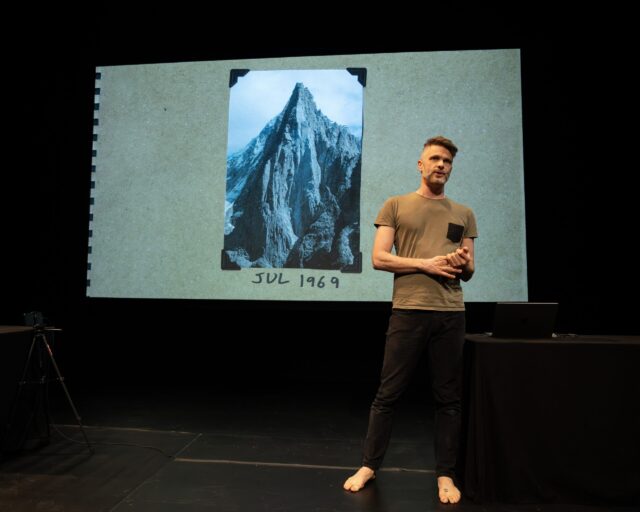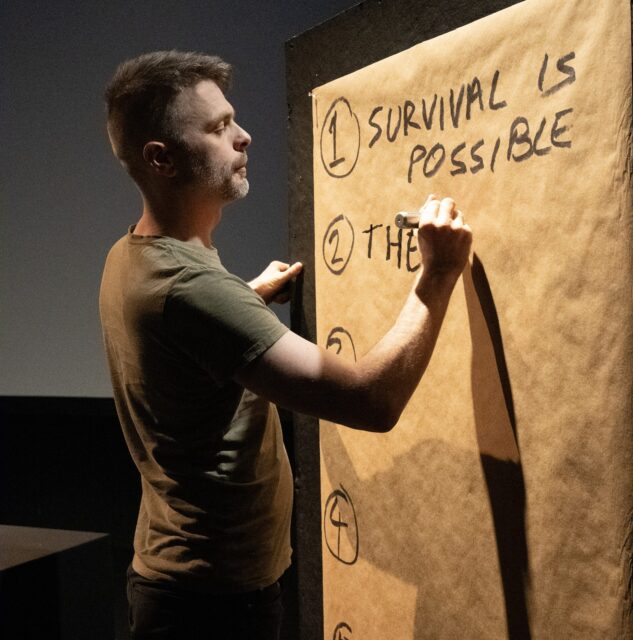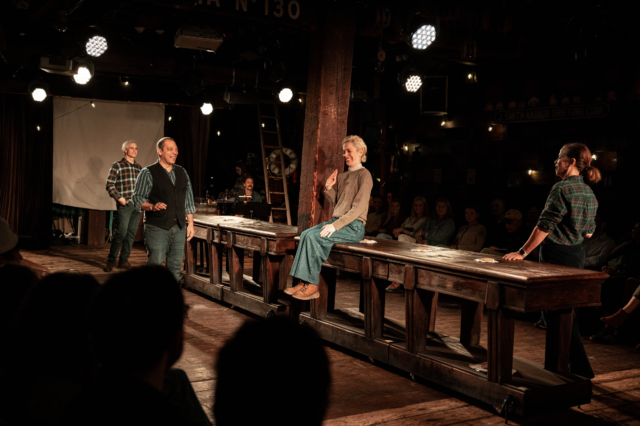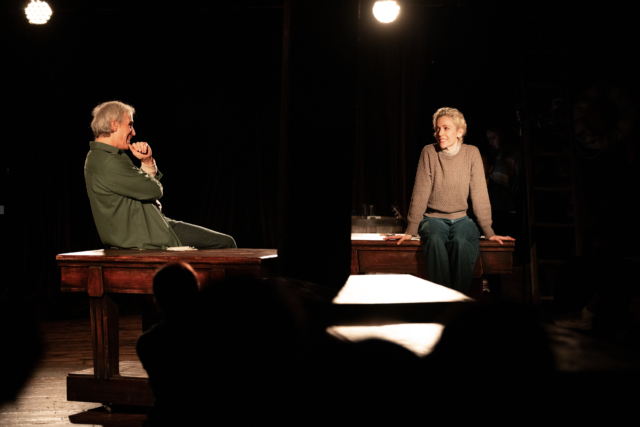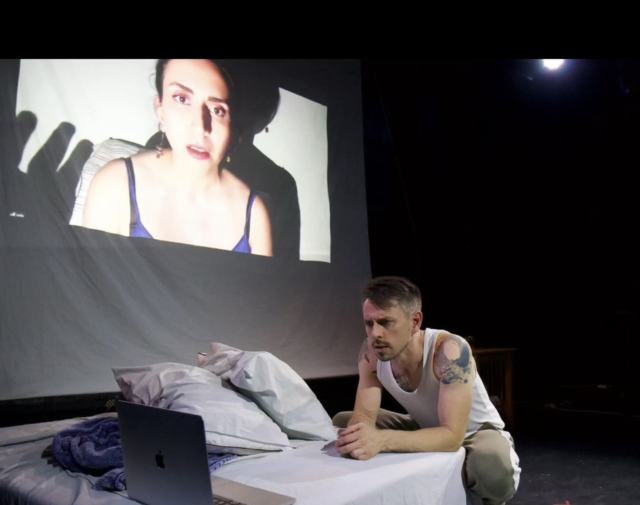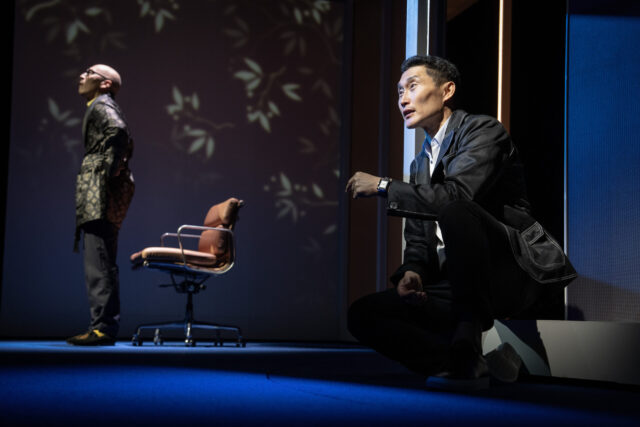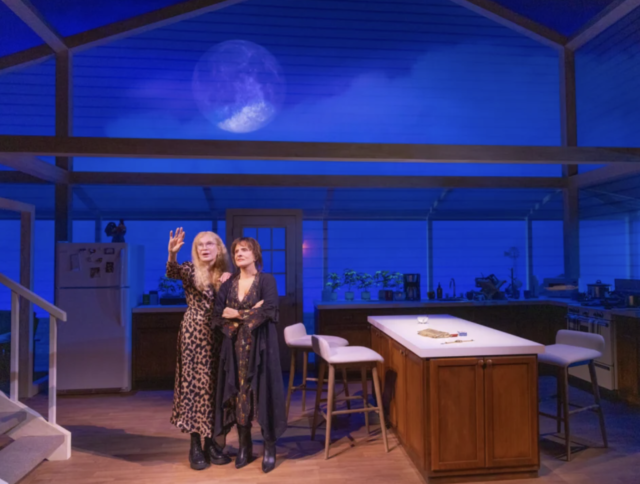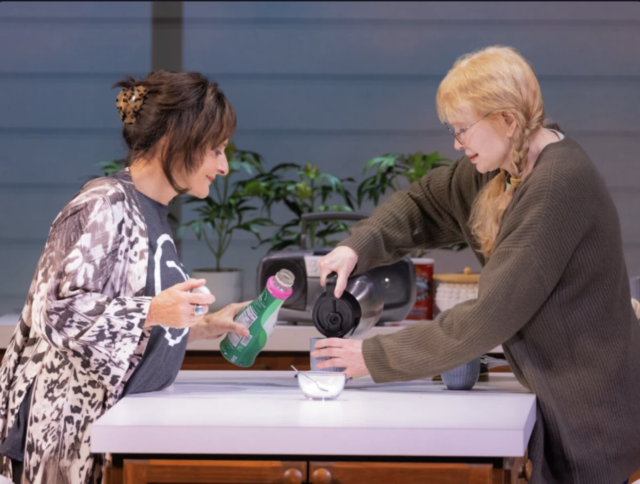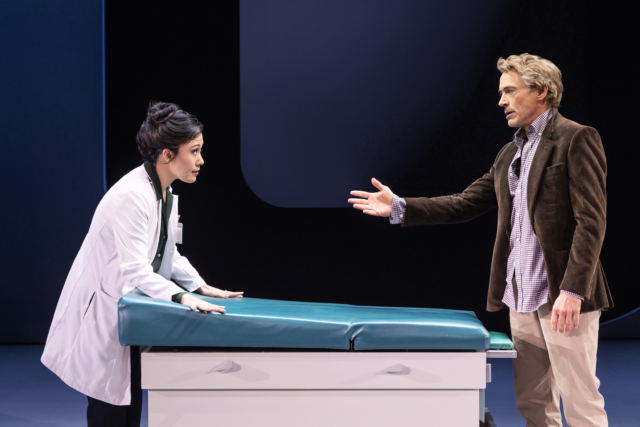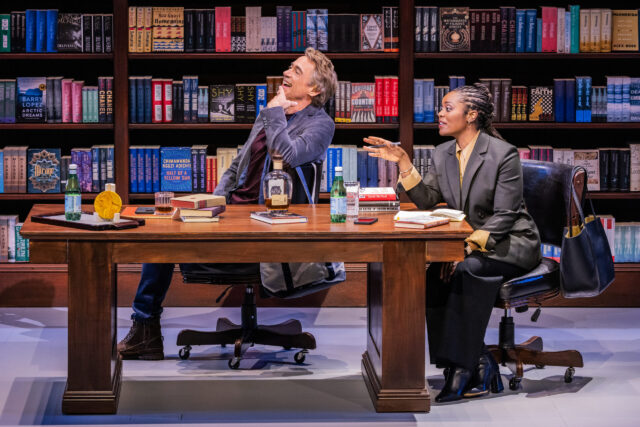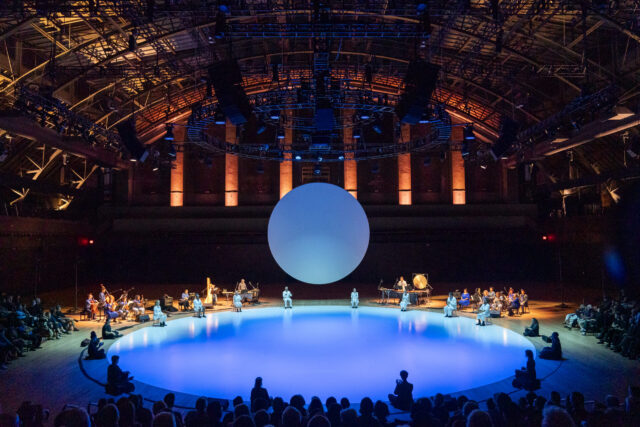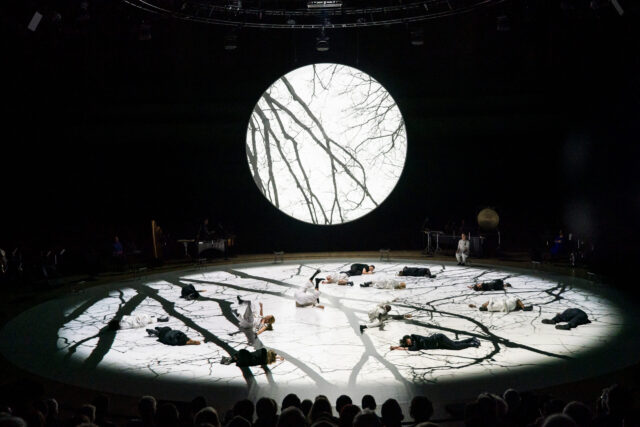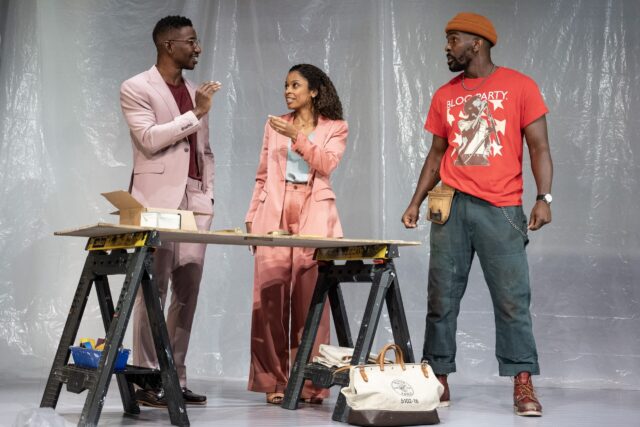
Mamoudou Athie, Susan Kelechi Watson, and Khris Davis star in Good Bones at the Public (photo by Joan Marcus)
GOOD BONES
Martinson Hall, the Public Theater
425 Lafayette St. at Astor Pl.
Tuesday through Sunday through October 27, $95
212-539-8500
publictheater.org
According to the Canadian website houseful, “‘Good bones’ refers to the core foundational elements of the home — a steady structure that can withstand time, wear, and elements. A home with good bones typically has a sturdy foundation, structural stability, and a strong roof. A well-staged home can hide imperfections with beautiful rugs, a fresh coat of paint, or features that pull your attention.”
Four current plays that take place primarily in a home struggle with the core foundational elements, with varying results.
Playwright James Ijames and director Saheem Ali follow up their Pulitzer Prize–winning Fat Ham, which ran at the Public’s Anspacher Theater before transferring to Broadway, with Good Bones, continuing at the Public’s Martinson Hall through October 27. Maruti Evans’s set is a skeletal house surrounded by plastic, undergoing renovation in an unidentified American city that itself is experiencing controversial gentrification.
Travis (Mamoudou Athie), who comes from money, and Aisha (Susan Kelechi Watson), who grew up in the projects, are a married couple who have moved back to her neighborhood and are considering having a baby. He is a chef preparing to open a restaurant, and she is working on a new sports complex she believes will vastly improve the community. Their contractor, Earl (Khris Davis), flirts with Aisha, who returns the interest, but when she shares the plans for the complex with him, he sees her as a traitor to her roots.
She explains, “We’re calling it the Jewel. It’s going to be kind of like a little village over there. This neighborhood has been abandoned to decay and atrophy. The Jewel will bring together the best of the old and the new. Will there be change? Yes. But change is the only thing consistent in this life. We have been sowing into this community. We have worked diligently to revitalize this neglected corner of the city. We’re changing this neighborhood for the better.” His quick response: “It’s the death star.”
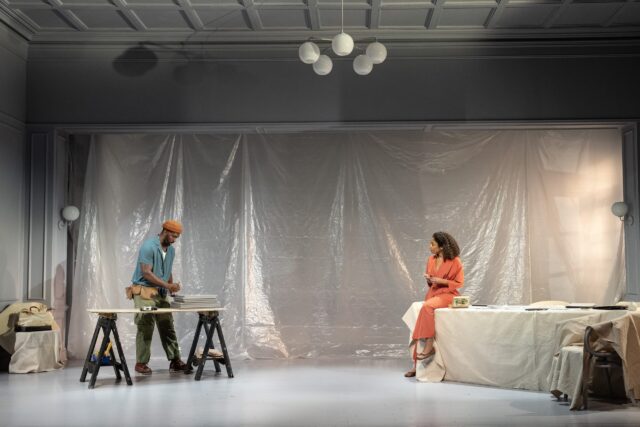
James Ijames’s Good Bones is in need of further renovation (photo by Joan Marcus)
Remembering how he used to play in the very house he is now working in, Earl tells Aisha, “These houses are sturdy. Shit’s built like a ribcage. The bones are so good. If . . . uh . . . you sit really still in here, you can feel the walls breathing and the floors lifting to meet your feet. That’s why I love these old houses. I get to spend time in a lot of haunted places.”
Good Bones follows in the lofty footsteps of Lorraine Hansberry’s A Raisin in the Sun and Bruce Norris’s Clybourne Park, but it lacks the character development and depth of those two award-winning works. Watson (Eureka Day, Merry Wives) and Athie (The Mystery of Love and Sex) have little chemistry; it might be the relationship between Travis and Aisha that requires renovating, but it’s hard to root for them because their marriage has no firm foundation.
Davis (Fireflies, Sweat) steals the show as the honest, hardworking, well-meaning contractor who has a more realistic view of the world, the only one who can see the ghost in the machine, and Téa Guarino (A Hundred Words for Snow, Antony and Cleopatra) is charming as his daughter, Carmen. But Good Bones needs more work, more than just a fresh coat of paint.
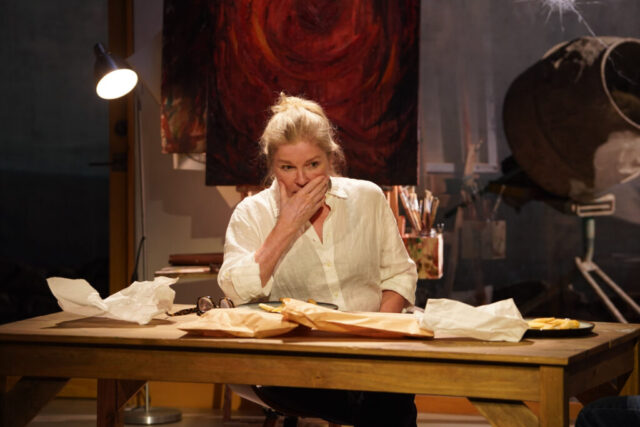
Kate Mulgrew outshines the material in Nancy Harris’s The Beacon at the Irish Rep (photo by Carol Rosegg)
THE BEACON
Irish Repertory Theatre, Francis J. Greenburger Mainstage
132 West Twenty-Second St. between Sixth & Seventh Aves.
Wednesday – Sunday through November 3, $60-$125
212-727-2737
irishrep.org
Obie winner and Emmy nominee Kate Mulgrew excels as an Irish abstract painter renovating her seaside home in Nancy Harris’s The Beacon, making its North American premiere at the Irish Rep through November 3. Mulgrew is Beiv (rhymes with gave), who is transforming her late husband’s cottage into a glass-enclosed space, as if she has nothing to hide — it has been long rumored that she might have had something to do with her spouse’s death.
She is surprised when her son, Colm (Zach Appelman), arrives with his new wife, Bonnie (Ayana Workman), who is a big fan of hers. Colm is surprised when he finds out that one of his old friends, Donal (Sean Bell), is helping with the renovation and has grown close to Beiv, who Colm always calls by her name, never “mom” or “mother.”
At the back of the room is Beiv’s most recent canvas, which is not quite finished yet. Examining it, Bonnie says, “You can really see the female rage. Like I’m instantly getting menstrual blood, the blood of childbirth, genital mutilation, hemorrhaging — pretty much all female suffering. Abortion is in there obviously . . . and repression and shame. But there’s also something really — tender too. Like there, in those softer shades, I see the vulva. And the clitoris, and this really female desire for pleasure, for sexual intimacy but also for like a really fucking explosive orgasm, you know. But yeah. No, it’s powerful. And brutal. And sad too.”
Beiv’s quick response: “It’s a blood orange.”
Of course, it’s actually something in between, and that “in between” is where the play, directed by Marc Atkinson Borrull, find itself stuck, unable to escape from its own trappings.
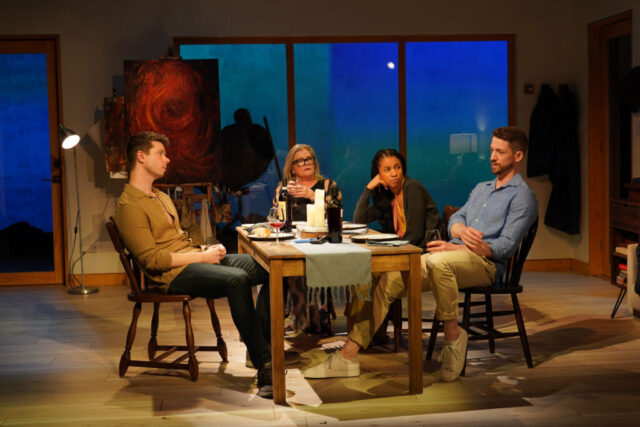
The Beacon is in need of more structure at the Irish Rep (photo by Carol Rosegg)
Beiv is a complex and fascinating character, superbly portrayed by Mulgrew (The Half-Life of Marie Curie, Tea at Five) with a compelling thread of intrigue. But when she’s not onstage, the narrative drags with didactic dialogue and meandering subplots, some of which feel completely unnecessary, such as the one involving Ray (David Mattar Merten) and Bonnie, although Ray overdramatizes things when he describes the house: “On one hand it looks like an idyllic little artist’s garret. Half-finished charcoal sketches sit scattered on a table. A large oil painting rests on an easel; there’s a huge glass window with sweeping views of the Atlantic. But the crack in the window from a recent break-in suggests another story. A darker story . . . a story of sex and violence and betrayal that’s hung around this cottage for over a decade.”
As always at the Irish Rep, the set, in this case by Colm McNally, is an impressive structure, but the story does not have the requisite good bones. It’s as if Harris and Borrull (Little Gem, Bedbound) knew where they wanted to end up but threw in too much as they get there.
Even the title is wasted on an unimaginative metaphor. Mulgrew herself is a beacon, but alas, in this production, she’s the only one who shines.
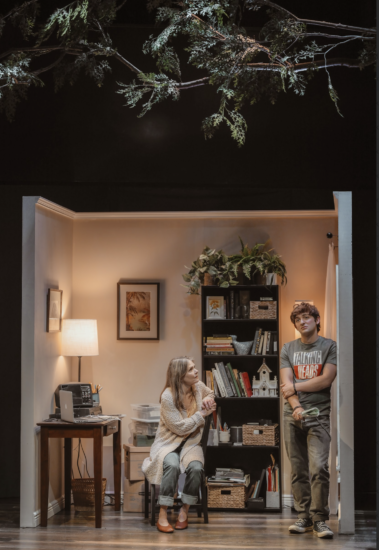
Martha Pichey’s Ashes & Ink trap the actors and characters in uncomfortable ways (photo by Thomas Mundell, Mundell Modern Pixels)
ASHES & INK
AMT Theater
354 West Forty-Fifth St. between Eighth & Ninth Aves.
Wednesday – Sunday through November 3, $39-$49
ashesink.ludus.com
www.amttheater.org
“‘Structure.’ Our lives need structure,” Molly (Kathryn Erbe) says early in the New York premiere of Martha Pichey’s Ashes & Ink. It’s a word that’s repeated several times in the play, which itself needs considerable rebuilding.
Running at the AMT Theater through November 3, Ashes & Ink moves between Molly’s apartment in New York City and her boyfriend Leo’s home in the country. Molly is a widow with a vast archive of birdsong she’s recorded and is categorizing with her sister, Bree (Tamara Flannagan); Molly’s teenage son, Quinn (Julian Shatkin), is an addict who has been in and out of rehab and is seeking a career in acting after having made an impact in a few movies. Leo is a widower raising his eight-year-old son, Felix (Rhylee Watson), by himself.
Quinn has once again left rehab, a place called Serenity House, so he can rehearse for his audition to get into the Royal Academy of Dramatic Arts in London. Prepared to do a monologue from Richard II — his father’s name was Richard — he instead does the classic, and obvious, “Tomorrow, and tomorrow, and tomorrow” soliloquy from MacBeth. The most important phrase is “signifying nothing,” to which he adds, “Nothing. Not a fucking thing.” That goes for the play as well, echoed later by Molly, who opines, “I am so deep inside my sucked dry bones sick and tired. I don’t know how to do this anymore. I don’t even know how to think anymore. I can’t remember anything.”
Tim McMath’s set switches from Molly’s cramped apartment, which resembles a psychiatrist’s office, where Quinn often sits in a chair complaining about his life, and the kitchen of Leo’s country house and under a tree on his property. The actors move the sets themselves; the first time they do it is fresh and exciting, but over the course of fifteen scenes, it grows tiresome, dragging down any pace the show is trying to achieve. For some reason, Molly leaves the window over the fire escape wide open, not the safest thing to do, especially when Quinn is running away from trouble.
Stagnantly directed by Alice Jankell, the play — Pichey’s debut — can’t get out of its own way as subplots turn ever-more ludicrous and the holes in the central story keep expanding. And I couldn’t help but cringe when Tony nominee Erbe (Something Clean, The Speed of Darkness, The Father) had to deliver the following lines: “If somebody told me my little boy would grow up to be an addict, I would’ve spat in their face. Aimed right for their mouth. . . . Take the lid off the pressure cooker, Molly! Watch it plaster the walls with all this gummy smelly stuff. Put your nose up to it, take a good whiff of this shit, this mix of ‘Could’ve done this,’ ‘Should’ve known that.’”
Without any kind of firm foundation, Ashes & Ink fails the smell test, among others.
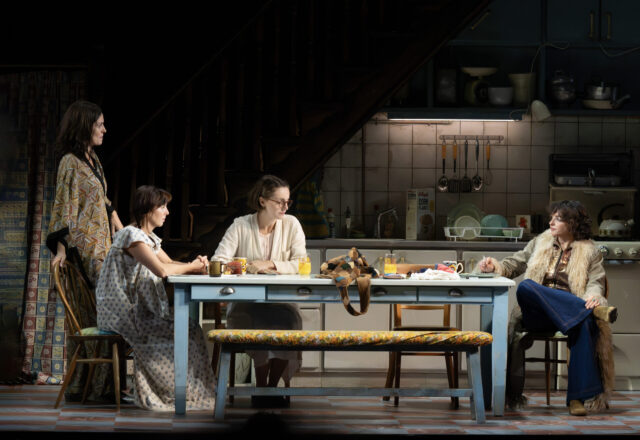
Sisters Gloria (Leanne Best), Ruby (Ophelia Lovibond), Jill (Helena Wilson), and Joan (Laura Donnelly) reunite as their mother lies on her deathbed in The Hills of California (photo by Joan Marcus)
THE HILLS OF CALIFORNIA
Broadhurst Theatre
235 West 44th St. between Broadway & Eighth Ave.
Tuesday – Sunday through December 22, $58-$351
thehillsofcalifornia.com
Rob Howell’s magnificent multilevel set for Jez Butterworth’s new play, The Hills of California, is a character unto itself, an Escher-like maze of rooms and staircases that rise into a mystical darkness. The main floor switches between 1955 and 1976 at a family-run Victorian guesthouse on the outskirts of the seaside resort town of Blackpool on the Irish Sea, providing a firm foundation for the gripping, if overburdened, narrative.
In 1976, sisters Gloria (Leanne Best), Ruby (Ophelia Lovibond), and Jill (Helena Wilson) have gathered at the fading Seaview Luxury Guesthouse and Spa because their mother, Veronica Webb, is dying in a room upstairs; they are waiting for their fourth sister, Joan (Laura Donnelly), who has not stepped foot in the house for twenty years, living in America. They are in what once was the private kitchen but is now a tiki bar with a one-armed bandit and broken jukebox that represent the siblings’ once-promising career. Their mother’s nurse, Penny (Ta’Rea Campbell), has offered the sisters the opportunity to bring in a doctor to end Veronica’s pain, but they don’t want to make any critical decisions until Joan arrives, something Gloria believes is highly unlikely.
“Times like these you find out who a body is. But go on. Stick up for her,” Gloria says sharply to Jill, who has spent her life taking care of the guesthouse and Veronica and is sure that Joan is on her way, exclaiming, “Well, I’m sorry. But it’s not Silly Jilly head-in-the-clouds, nor sticking up for no one. I know my sister. If Joan says she’s coming, she’s coming. There. I’ve said it.”
In 1955, single mother Veronica (Donnelly) is training young Gloria (Nancy Allsop), Ruby (Sophia Ally), Jill (Nicola Turner), and Joan (McDonnell) to become the next Andrews Sisters, rehearsing Johnny Mercer’s 1948 hit “The Hills of California,” which features the lines “The hills of California will give ya a start / I guess I better warn ya cuz you’ll lose your heart / You’ll settle down forever and never stray from the view / The hills of California are waiting for you.”
“What is a song?” Veronica asks, answering, “A song is a place to be. Somewhere you can live. And in that place, there are no walls. No boundaries. No locks. No keys. You can go anywhere.” A song is its own kind of structure, its own kind of home, meant to bring people together, but in The Hills of California, it tears a family apart.
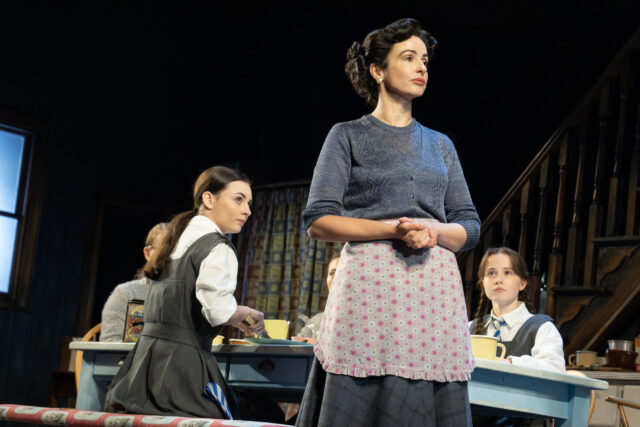
Veronica Webb (Laura Donnelly) is a controlling British stage mother in Jez Butterworth’s The Hills of California (photo by Joan Marcus)
Tony winner Butterworth (The River, Jerusalem) and Oscar, Tony, and Olivier-winning director Sam Mendes (The Lehman Trilogy, Cabaret) previously teamed up on The Ferryman, which won four Tonys and boasted an ensemble of nearly three dozen performers including covers. The Hills of California is overstocked with minor male characters who disappear into the woodwork, even Luther St. John (David Wilson Barnes), who is involved in a key scene that influences the girls’ future and their relationship with their mother.
About fifteen minutes have been cut from the original three-hour London production and the early previews on Broadway, leaving some gaps in the narrative, along with several moments that feel extraneous, such as when Veronica forces a lodger (Richard Short) to take the long way home, barring him from the shortcut through the kitchen. But when the story focuses on the mother and her daughters, in both time periods, the play finds its foundation, with sharp, poignant dialogue, lovely music by Nick Powell, and pinpoint choreography by Ellen Kane.
Donnelly, who has appeared in several plays written by Butterworth, her partner (they have two children together), is whip-smart as Veronica, a controlling stage mother who recalls Rose Hovick in Gypsy, currently played by Audra McDonald right next door at the Majestic. (On the other side is another show about a mother and daughter and music, Hell’s Kitchen.)
America is not referenced just in the song; the rooms in the guesthouse are named after such US states as Colorado, Alabama, Indiana, Minnesota, and Mississippi, where the critical event happens in 1955 and where Veronica is dying in 1976, reminding the audience that this kind of tale can happen anywhere.
In her 2016 poem “Good Bones,” British actress Maggie Smith, who passed away in September at the age of eighty-nine, writes, “Any decent realtor, / walking you through a real shithole, chirps on / about good bones: This place could be beautiful, / right? You could make this place beautiful.” Even with its occasional skeletal forays, The Hills of California has good bones, filled with a glorious beauty.
[Mark Rifkin is a Brooklyn-born, Manhattan-based writer and editor; you can follow him on Substack here.]
